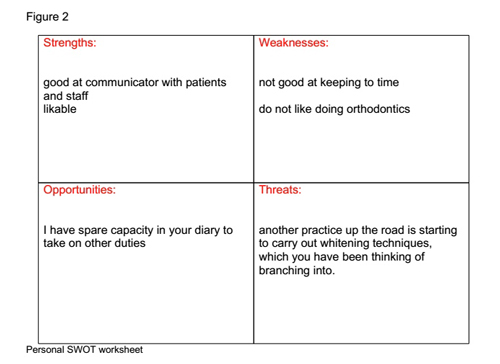![]()
How do I complete a PDP?
It is advisable to start by carrying out a SWOT (Strengths, Weaknesses, Opportunities and Threats) analysis.
• Strengths – things that you or your organisation are good at.
• Weaknesses – things that you or your organisation are not good at.
• Opportunities – potential directions that may be worth exploring in the future.
• Threats – potential problems facing you or your organisation.
Many people are now familiar with this process, which identifies areas in which you do well and which you should capitalise on, areas that you struggle with and need to improve on, and outside factors that affect the success or failure of your endeavours. It will also help you look at your working role, home life, workplace and colleagues.

You will probably find that you have more than one topic in each of the areas. This is good and gives you additional points to take into consideration, with more flexibility giving you more options.
Looking at the statements that you place in the boxes may help you to decide on additional training, for example in smoking cessation. This will give you opportunities to use your spare diary capacity, utilise your communication skills, and help you in working to time schedules. Instead of going into competition with another company, you will have a prime speciality to offer.
These decisions are seldom made in isolation and can form part of your appraisal process or development plans with your manager.
Those of you who are familiar with SWOT and feel it does not always help you to achieve your full potential may want to add a further dimension - the PEST (Political, Economic, Socio-cultural and Technological) analysis. This considers the bigger picture of the external factors that can either build or hinder your career. Using it can have a huge effect on your career opportunities. The topics in more detail are:
• Political factors – Here you consider how the government and its policies can affect your career. What regulations are in place (and what changes are taking place) that will have an impact on you, your organisation or your profession?
• Economic factors – These are the monetary aspects that can affect what you do. Will your wage go up? Will you need to pay for training? Will you need additional equipment? Can others do your job less expensively?
• Socio-cultural factors – What are the demographic trends that can affect your career/training pathway? Are there any changes in qualifications taking place? Do you have a family to take into consideration? Is the practice manager prepared to offer support and backing?
• Technological factors - What technological factors can affect your decisions? Technology is changing rapidly; will you need to learn new skills? Will a technological development render the career decision you are making obsolete? What opportunities and threats does this pose to you fulfilling your objectives?

